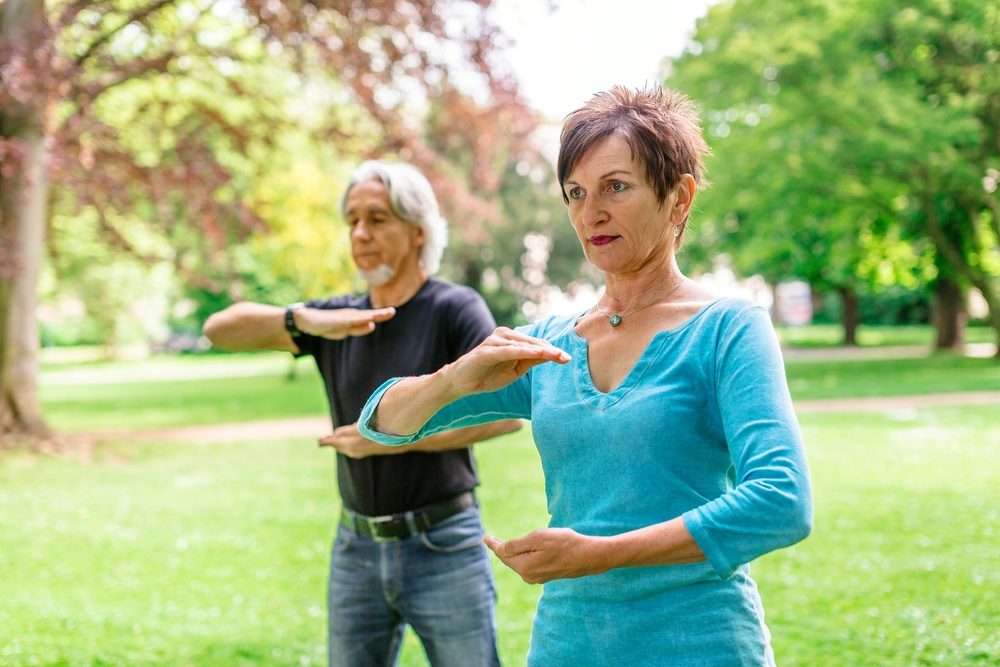 |
| Playing golf study Credit: Mike Ehrmann/Getty |
"We know that people with Parkinson's disease benefit from exercise, but not enough people with the disease get enough exercise as therapy.""Golf is popular -- the most popular sport for people over the age of 55 -- which might encourage people to try it and stick with it. We decided to compare golf to Tai Chi in our study because
Tai Chi is the gold standard for balance and preventing falls in people with Parkinson's.""Our finding that golfers were much more likely to continue with their sport is exciting because it doesn't matter how beneficial an exercise is on paper if people don't actually do it."Dr.Anne-Marie Wills, Massachusetts General Hospital, Boston
 |
| Exercise is an important part of healthy living for everyone. For people
with Parkinson’s disease (PD), exercise is more than healthy — it is a
vital component to maintaining balance, mobility and activities of daily
living. Exercise and physical activity can improve many PD symptoms.
These benefits are supported by research. Parkinson's Foundation |
An industry of offerings for exercise treatment for Parkinson's focus on Tai Chi classes. Tai Chi is known for its role in improving balance and mobility, according to studies. According to Richard Selby who instructs in Tai Chi at the Central London Community Health-care NHS [British National Health Service] Trust's Parkinson's Day Unit, patients are given a "sense of well-being which helps them manage their condition better".
Twice-weekly Tai Chi training, according to a previous study reported in the New England Journal of Medicine, led to improved postural stability, walking ability, and fewer falls on the part of patients. Now another research project has surfaced with interesting conclusions. The research is to be presented at the annual meeting of the American Academy of Neurology where the finding that people who practise golf swings at a driving range appear quicker and more mobile following ten weeks of practise than those who practised Tai Chi is to be released.
 |
| John Hopkins Medicine |
Not a particularly large study, with twenty participants with moderate Parkinson's disease. The study participants were divided into two groups where eight people were randomly assigned to practise golf, a dozen others did Tai Chi. Both groups completed the assigned ten weeks of two one-hour group classes weekly. Researchers tested patients' balance, walking ability and risk of falling, both at the start and the finish of the study.
Study participants were timed in one test that had them rising from a chair, walking ten feet, and then returning to the chair and seating themselves. Those who practised golfing, were timed at 0.96 seconds faster at the end of the test, than at the beginning. Those who practised Tai Chi were 0.33 seconds slower in response, while no difference was seen between the two groups in risk of falls or adverse effects.
Over four in five of the people who were assigned golf felt they were likelier to continue golfing, in comparison with a third of those who practised Tai Chi, feeling they would be interested in continuing with it. Perhaps it would be best not to overlook the fact that exercise of any kind is beneficial to those with Parkinson's; some types more effective overall, but all choices render benefits.

"Although Tai Chi shows statistically significant improvements on motor
function and balance for patients with PD in the current meta-analyses,
there is indeed not enough evidence to conclude that Tai Chi is
effective for PD because of the small treatment effect, methodological
flaws of the eligible studies, and insufficient follow-up. Consequently,
large-scale, high-quality RCTs with long follow-up are warranted to
confirm current findings of Tai Chi for PD."
Conclusion: A Meta-Analysis on the Efficacy of Tai Chi in Patients with Parkinson's Disease
"We found that a program of twice-weekly tai chi for 24 weeks, as
compared with a resistance-training program or a stretching program, was
effective in improving postural stability and other functional outcomes
in patients with mild-to-moderate Parkinson's disease. Tai chi training
also significantly reduced the incidence of falls, as compared with the
stretching program. Improvements in primary and secondary outcomes were
maintained 3 months after the intervention, a finding that is
consistent with prior research involving adults 70 years of age or
older.13
No serious adverse events were observed during tai chi training,
indicating the safety and usefulness of this intervention for persons
with Parkinson's disease."
Tai Chi and Postural Stability in Patients with Parkinson's Disease
Fuzhong Li, Ph.D., Peter Harmer, Ph.D., M.P.H., Kathleen Fitzgerald, M.D., Elizabeth Eckstrom, M.D., M.P.H., Ronald Stock, M.D., Johnny Galver, P.T., Gianni Maddalozzo, Ph.D., and Sara S. Batya, M.D.
 |
| Parkinson's News Today |
Labels: Exercise Benefits, Golf, Parkinson's Disease, Research, Study, Tai Chi

0 Comments:
Post a Comment
<< Home